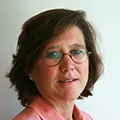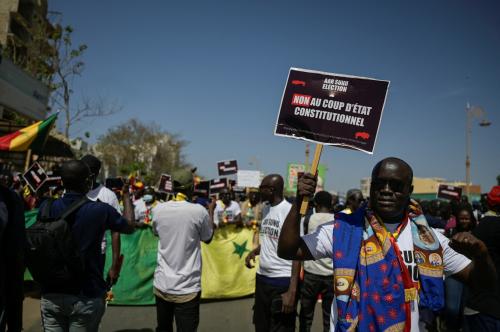In a speech preceding the recent Financing for Development Conference in Monterrey, Mexico, former International Monetary Fund (IMF) Director Michel Camdessus noted that if the summit could only deliver one thing, it should be extending assistance to enhance institutional capacity in poor countries. Addressing this problem is key to achieving the Millennium Goals-established at the September 2000 UN Millennium summit-of reducing world poverty by half by 2015. Countless development efforts have failed because countries lack institutions with the ability to sustain their economic policies. The crisis in Argentina-triggered in large part by the country’s reliance on an inflexible currency regime and by its inability to rein in fiscal flagrancy by local governments-is a case in point. Meanwhile, numerous discussions at Monterrey highlighted weak institutional capacity as a major obstacle to economic development.
This policy brief proposes an international initiative for building institutional capacity, and provides some rough guidelines for its implementation. The initiative should focus on the institutions that enhance poor countries’ capacity to: implement sound macroeconomic and social sector policies; implement and oversee the poverty reduction strategy process (PRSP); better utilize official development assistance (ODA); participate in international tax and trade regimes; manage labor, employment, and insecurity issues; and respond to international efforts to better manage global public goods, such as increased production of vaccines for important global diseases and better environmental protection.
POLICY BRIEF #98
The Institutions Puzzle
A major objective of the Monterrey summit—and of President Bush’s recently proposed “New Compact for Development”—is marshaling international efforts and resources to meet the Millennium Goals. An equally important component of achieving those goals is enhancing the institutional capacity of the developing countries to better manage their macroeconomic and social sector policies. Without the ability to manage these policies, poor countries often cannot absorb external resources, whether they are in the form of financial flows, technical expertise, or global public goods.
Indeed, both supporters and critics of development assistance blame weak institutions for development failures. “Institution building” is a catch-all concept that encompasses a wide variety of goals that have always been at the core of overcoming underdevelopment. These goals include enhancing governance, which includes the making and enforcing of rules and laws; improving public administrative and regulatory systems, which includes the provision of public services, such as water and roads; and more efficient and equitable provision of public goods and services, which range from defense to education and health. Technical assistance—i.e., expertise that international institutions either give to poor countries and/or provide for a fee—has traditionally addressed a range of institutions in all of these areas except making rules and laws, because it sought to avoid interference in that realm. Yet serious efforts to enhance governance capacity may have to address problems or malfunctions in the structure of institutions in this area. This is just one example of an area which will require the proposed initiative to include new kinds of technical assistance and to extend beyond the purview of the Bretton Woods institutions (the World Bank and the IMF).
No Magic Bullets
No Magic Bullets In contrast to macroeconomic and public expenditure reforms, where experience has yielded clear lessons, guidelines, and benchmarks for progress, institutional reform and capacity building remain areas where there are plenty of diagnoses of the problems and failures, but an absence of standard prescriptions for reform. Numerous studies highlight the role of pervasive corruption and weak governance, for example, in undermining the best-intentioned economic reform efforts. Yet the same studies rarely provide solutions to those problems. Other studies, such as the World Bank’s 2001 World Development Report, highlight the role of institutions in determining the ability of markets to function efficiently. An important first step in developing feasible reform strategies is defining institutional functions and failures, in order to better understand where reform efforts should focus [for a taxonomy of institutional failures, see table 1].
Because the reform agenda is so broad—and suffers from imprecise definition—there are no magic bullets. It is easier, then, to circumvent weak institutions than to fix them, and policymakers and practitioners often avoid the institutional reform agenda. But no matter how difficult, both policymakers and practitioners must pursue this agenda in order to meet and sustain the Millennium Goals.
This proposal provides a rough sketch of how the international financial institutions, collaborating with a range of other participants, could provide a forum for an international initiative to strengthen institutions in the developing economies. The forum would serve as a clearinghouse for accumulating and disseminating lessons learned from ongoing experience in technical assistance and capacity building attained in global and regional financial institutions, as well as in the developing countries themselves. It would also provide a way to identify new areas where knowledge and assistance efforts are insufficient, such as governance. Finally, a forum would highlight the need for donor support to reach the initiative’s goals, and include institutional reform among the objectives to which additional, post-Monterrey ODA is directed.
Sustaining and Implementing the PRSP Process
The approaches of the IMF and World Bank to poverty reduction changed dramatically with the introduction of the PRSP, a process in which the recipient countries themselves, as a prerequisite to receiving loans, propose a poverty reduction strategy that is crafted on the basis of consultations between the government and representatives of civil society. Both organizations’ efforts in the poverty reduction and capacity building arenas hinge to a large extent on the poverty reduction strategy process, and expectations have been heightened among both the donor community and the countries involved.
To be sure, the introduction of this process has represented major progress in providing a framework for coordinated donor support for country-owned programs. Criticisms of the PRSP process range from ones that say it is too complex, making it difficult for poor countries to complete it, to those that question the extent to which the process is participatory at all. In the end, there will be a wide range of results, because the PRSP depends largely on governments and their ability to solicit the participation of non-government actors. Government capacity, the transparency and openness of the political system, the structure of civil society, and the sophistication of non-government organizations vary greatly, particularly in very poor countries. The IMF’s ongoing review of the PRSPs should evaluate the extent to which the diversity of results from the process hinge on the transparency and capacity of the respective governments. A better understanding of this diversity of results could also serve to better align expectations of the process—both within and outside the countries—with the abilities of the institutions in each country.
The implementation and oversight phases of the process may require new kinds of assistance, and new participants and institutions. In the United States, for example, institutions like the Congressional Budget Office and the Center on Budget and Policy Priorities provide independent oversight. Similar institutions exist in some developing countries, but are rare. Without them, many countries lack the institutional capacity necessary to manage a process whose success hinges on the ability of governments to solicit broad and transparent participation, and of non-government organizations to play a sustained, neutral role.
Reducing Insecurity
As most developing countries, including the good performers, are vulnerable to exogenous shocks and lack developed social assistance and social insurance systems, a large percent of the individuals who escape poverty remain vulnerable to future periods of poverty. For example, in a 2000 World Bank study, Lant Pritchett and his colleagues found that over a three-year period in Indonesia (1997-2000), the poverty ratio was 20 percent, but at least 50 percent of the population fell below the poverty line at some point.
The usual focus of safety nets—and of much external assistance—is on short-term measures to ease adjustment costs during crises. A longer-term focus should be developing more permanent safety nets and social insurance systems, which can be phased in and out as necessary as a response to periodic crises—such as recessions induced by steep drops in commodity prices or currency crises in neighboring countries—and are financed as part of a longer-term social contract. The more typical scenario is that safety net programs are developed and implemented in response to crises. The lag involved, which includes the identification and/or the development of appropriate implementing institutions, is often longer than a year and results in high associated costs. Technical assistance for developing long-term systems—which will ultimately have to be financed domestically—could be financed by the international institutions, and will require gathering information about experiences in other countries. Safety nets for the poor in the poorest countries, meanwhile, will still require substantial external financing.
Increasing ODA Effectiveness
The Financing for Development Conference discussions have stressed the need for donor countries to increase their contributions to ODA to a level closer to the UN target of 0.7 percent of Gross National Product. However, provision of aid must be more efficient. Without an appropriate incentives structure and ownership in recipient countries, increased aid could do as much harm as good. Calls for increased ODA must recognize the need to increase the effectiveness of aid, primarily because increasing ODA levels will require political support from skeptical citizens—and taxpayers—in donor countries. Genuine progress in increasing ODA levels and resolving some of the problems undermining its effectiveness would involve confronting two difficult issues: countries performing well and receiving increased aid require institutional capacity to absorb that aid, and countries performing poorly must have incentives to implement reforms so they can get funds.
The latter is among the most difficult remaining challenges. Technical assistance—which helps countries develop key institutions—can help effect change, but it is unlikely to significantly alter the broader political economy. The international community must pay attention to those countries with unsound macroeconomic policies and regressively distributed public expenditures, and must encourage them to adopt reforms. Some countries that continue to receive international assistance allocate relatively large percentages of their public expenditure to defense and very small percentages—well below 5 percent—to education and health. Not surprisingly, these countries tend to be those with extremely high rates of illiteracy and infant mortality. Institutions are only a part of the solution. Another and more difficult part is making the needs of the poor a political priority for both the public and government in these countries.
A Global Tax Dialogue
Globalization is increasing international spillovers between national tax systems. There is currently no institutional structure within which all countries can consider these issues comprehensively. A new institutional framework to address tax matters of cross-country concern was part of the Monterrey discussions. The focus of the network will be: discussing tax issues of common interest (principally those with cross-border impact); disseminating “best practice” information on tax policy and administration; sharing information on technical assistance activities; and discussing the impact of different fiscal regimes on poverty and income distribution.
As is the case with all of the initiatives outlined above, the developing countries that stand to benefit the most are those with sufficient institutional ability to pursue effective fiscal policy, as well as to enforce, monitor, and adapt it as necessary. Developing fiscal capability is an ongoing emphasis of the IMF’s technical assistance program, and learning from these efforts and assessing their relevance to a broader set of institutions could be a focus of the proposed initiative.
Liberalizing Trade, Opening Markets in Developing Countries
As developing countries, particularly the poorest ones, attempt to integrate more deeply into the global economy, there is a clear need to enhance their ability to negotiate and implement agreements, improve the investment climate, and reduce internal impediments to trade, as well as to adopt development strategies that use trade as a mainspring for growth. These efforts will now assume a larger role in the aftermath of the 2001 World Trade Organization (WTO) ministerial conference in Doha, as long as all parties involved are genuinely committed to fulfilling the conference’s objectives of liberalizing trade regimes in both developed and developing economies. It is essential, though, that the advanced economies follow up on their promises with a genuine increase in market opening to developing country goods.
To complement these efforts, the initiative proposed here should emphasize tailoring the negotiating process to the needs of smaller countries for whom the transaction costs of negotiating trade agreements are very high. In the short term, helping small, poor countries deal with these costs could be a focus of increased ODA, while technical assistance could help strengthen the institutional capacity of these countries as they attempt to broker trade agreements. A longer-term objective could be making the WTO process more accessible and less cumbersome for small, poor countries.
Provision of Global Public Goods
There is a high degree of consensus on the importance of a number of global public goods, notably the fight against infectious diseases and HIV/AIDS. However, there is much less consensus on how to efficiently enhance the provision of global and national public goods more generally. There is a wide range of relevant areas, including crisis prevention and resolution; the control of infectious diseases; and environmental protection and preservation of bio-diversity.
While most of the discussion of public goods has focused on the international dimension, an additional complementary effort is required to strengthen the necessary supporting institutions in the developing countries. Improvements in patent legislation to enhance the provision of low-cost HIV drugs or vaccines in developing countries, for example, ultimately rely on the ability of institutions in poor countries to manage the improvements in the supply of goods that result from incentives for more production of these goods. In the absence of such institutional capacity, it is unlikely that the goods will reach the poor in poor countries.
Strengthening Institutions: Structuring the Initiative
Most of the discussion of governance in the context of the Millennium Goals has been on the role of international actors. An underlying assumption of this proposal is that countries with weak institutions will benefit the least from international efforts to improve management of global public goods and from the pooling of information and efforts in areas of common interest, such as tax, trade, and employment. This brief proposes launching an effort to explore new ways of providing technical assistance to build institutions in developing countries, and to support countries’ efforts to adapt their own public institutions to new global standards and, more generally, to the requirements of globalization in the economic, trade, financial, and even social arenas.
However, in contrast to macroeconomic reform, where there is consensus on most basic policy prescriptions, there are few established prescriptions for institutional reform, in part because public institutions have such a wide range of functions and responsibilities. The available data on the structure and function of public institutions in developing countries is mostly limited and ill-suited for quantification or for cross-country comparison. In addition, although there are some exceptions, there is very little data that captures public perceptions of institutional roles and performance. Yet much of the literature on institutions suggests that the key to effective institutional function is public consensus on the unwritten rules of the game, a consensus that is reflected in public confidence in institutions. This is a clear example of an area where new kinds of data are required. The institutions forum could play a major role in sponsoring the creation of the necessary data sets.
The proposed initiative must compensate for the poorly defined nature of the task of strengthening and reforming institutions, as well as take advantage of ongoing efforts that both complement and inform its efforts. The first task confronting participants in the forum would be to define the parameters of its operations. Two rather different concerns need to be addressed. The first is the need to consider the broad range of institutions that are critical to good governance and economic development. The second is distinguishing between that broad set of institutions and the narrower set that can benefit from technical assistance.
An initial assessment of knowledge about what kinds of technical assistance do and do not work will be critical to defining the parameters and should include a review of the experience of the World Bank and the IMF in their traditional areas. But it should also include more novel and even experimental efforts in other agencies—such as the regional development banks and bilateral donor agencies—in nontraditional areas such as judicial reform. Some institutions, like the judiciary, are so critical to the function of both markets and governments that they must be included in this initiative even if past attempts at technical assistance have been unsuccessful.
While the lessons and experience from technical assistance efforts may be familiar to those working within international financial institutions such as the IMF and World Bank, policymakers involved in the difficult task of strengthening institutions in their own countries often lack guidelines and information on successful efforts elsewhere in the world. Disseminating the results of those efforts will ultimately be crucial to the success of the initiative in helping developing countries help themselves. As an organizing principle, the initiative could focus on the critical role that institutions will play in achieving the Millennium Goals. It could identify and concentrate on the institutions which are critical to:
- implementing sound macroeconomic and social sector policies (primarily institutions that are already the focus of technical assistance efforts)
- implementing and overseeing the PRSP process
- better utilizing official development assistance
- participating effectively in the international tax network and in international trade negotiations
- managing labor and employment, as well as insecurity issues
- responding to international efforts to better manage global public goods
Like the model provided by the Global Tax Dialogue, the institutions forum could serve as both a convening forum and as a bank of collective expertise that can be used by all member countries and institutional actors. It should have links with technical assistance programs in the international institutions, and with agencies and networks whose core activities ultimately rely on institutional capacity within the developing countries, such as the International Labor Organization and the WTO.
The forum could be hosted by one of the international financial institutions—either the World Bank or the IMF—but would be an independent entity with selected members from those institutions, from the scholarly community, and from the policymaking community in the developing countries. Given its primary role as a convening body and repository of expertise, its permanent staff could be very small. Launching the initiative would entail only a minor diversion of the new resources—on the order of a few million dollars—that are generated as a result of the Monterrey summit. The costs would be minimal in comparison to the potential benefits from better utilization of ODA.



